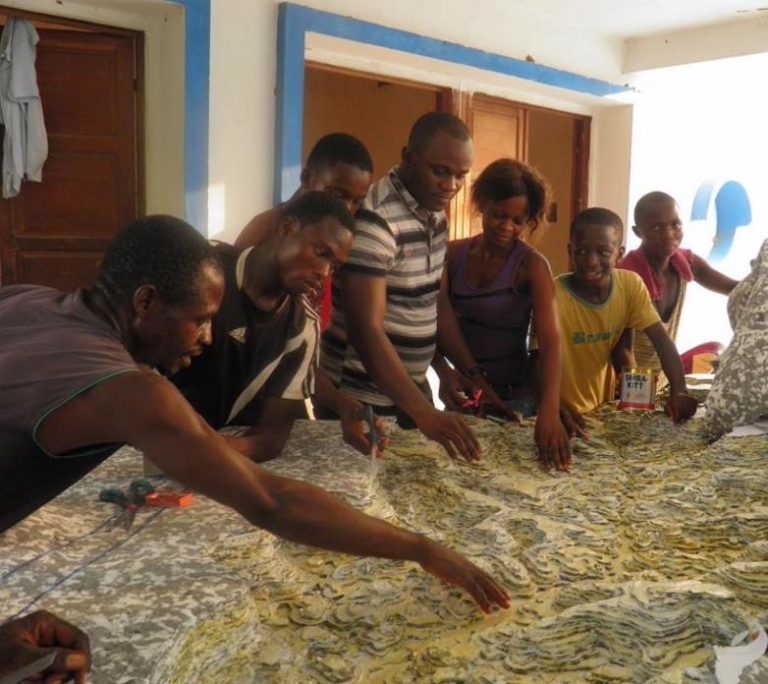Improved food security, water supply and livelihoods in select African countries (UNEP)
 In several African countries, Development Account-supported projects implemented by UNEP have enhanced food security and water supply, improved livelihoods, and strengthened disaster resilience. From building the capacities of stakeholders to integrating the ecosystem-based approach into local and national planning, to establishing advisory groups and collecting scientific data, countries such as the Democratic Republic of Congo, Malawi, Mozambique and Zambia, stand to gain long-term benefits from capacity development projects funded by the Development Account.
In several African countries, Development Account-supported projects implemented by UNEP have enhanced food security and water supply, improved livelihoods, and strengthened disaster resilience. From building the capacities of stakeholders to integrating the ecosystem-based approach into local and national planning, to establishing advisory groups and collecting scientific data, countries such as the Democratic Republic of Congo, Malawi, Mozambique and Zambia, stand to gain long-term benefits from capacity development projects funded by the Development Account.
Sustainable and resilient ecological food systems using an ecosystems-based approach
The Building sustainable and resilience ecological food systems using ecosystem-based adaptation in agriculture-dominated landscapes in Sub-Saharan Africa project that UNEP implemented with support from the 9th tranche of the Development Account led to important results at both policy and operational levels. For example, Zambia’s Food Crop Diversification Policy, Farmer Input Support Programme and Marketing Policy all include incentivizing sorghum production for climate resilience, and food and livelihood security. In Mozambique, the World Food Programme (WFP) worked with partners to integrate ecosystem-based adaptation as a preventative measure in disaster response policies for food security. The project helped restore over 15 hectares of land along river basin banks that had fallen victim to degradation, through agroforestry. With over 28,000 trees planted, the drying Ulungwi River in Malawi was restored to ensure sustainable supply of irrigation and potable water. The project also mobilized youth groups to partner with farmer cooperatives in developing ecosystems-based adaptation farms.
Policies on water supply and rural livelihoods
The Promoting integrated water catchment management to improve urban drinking water supply in the Democratic Republic of Congo and the Central African region project that UNEP implemented with support from the 8th tranche of the Development Account focused on improving water supply and rural livelihoods through river basin management and ecosystems-based measures, as well as supporting policy advocacy in the Democratic Republic of Congo. The community-based catchment management action plan that was developed through the project and officially endorsed by the government was the first of its kind in the Democratic Republic of Congo and in the Central African region.
“The project shows that catchment-based planning is part of the solution to resolving the country’s drinking water crisis. It’s proposed expansion to the larger N’Djili basin is a concrete step to helping ensure better water access to Kinshasa’s rapidly growing population. The future for catchment-based integrated water resource management in the DRC looks bright; it’s finally taking off.” – Senior Water Expert at the Ministry of Environment, Nature Conservation and Sustainable Development (Democratic Republic of Congo)
 The new national water law of the Democratic Republic of Congo and the recently endorsed roadmap to develop a National Policy on Sustainable Water Resources Management both provide the foundations for sustaining the efforts initiated through UNEP with the support of the Development Account.
The new national water law of the Democratic Republic of Congo and the recently endorsed roadmap to develop a National Policy on Sustainable Water Resources Management both provide the foundations for sustaining the efforts initiated through UNEP with the support of the Development Account.
Impact beyond policy and legislation
The impact and sustainability of the Development Account-supported UNEP projects have gone beyond national legislation and policy. The project on resilient ecological food systems has, for example, helped contribute towards incomes of farmers in Malawi being enhanced and towards reducing food insecurity by focusing on the production of high value, climate-resilient crops.
Through the above projects, environmental issues have been integrated into economic and agricultural policies and plans, ensuring sustainability and maximum impact.
One of the lessons learnt from these projects is that participatory, inclusive and country-driven approaches encourage stakeholders to have a stronger sense of ownership and participation in achieving results. A bottom up, community-based approach needs to be gradually linked with national institutions to ensure sustainability and replication. Positioning interventions as a practical solution to everyday challenges is also crucial to encourage participation of non-state actors like the private sector and academia.